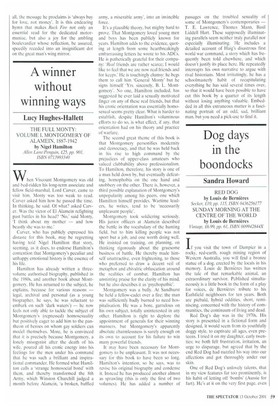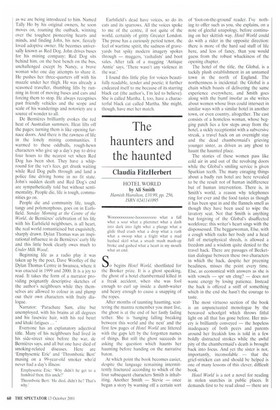Dog days in the boondocks
Sandra Howard
RED DOG by Louis de Bernieres Seeker, 410, pp. 115. ISBN 0436256177 SUNDAY MORNING AT THE CENTRE OF THE WORLD by Louis de Bernieres Vintage, £6.99. pp. 61, ISBN 009942844X If you visit the town of Dampier in a rocky, red-earth, rough mining region of Western Australia, you will find a bronze statue of a dog, erected by the locals in his memory. Louis de Bernieres has written the tale of that remarkable animal, an extraordinary survivor. Published simultaneously is a little book in the form of a play for voices, de Bernieres. tribute to his Earlsfield neighbours for ten years. Both are piebald, hybrid oddities, short, reminiscing, concerned with the history of communities, the continuum of living and dead.
Red Dog's day was in the 1970s. His story is presented in a fictional form and designed, it would seem from its youthfully doggy style, to captivate all ages, even preteens. I tried it on my daughter, early twenties: we both felt frustration, irritation, an urge to disparage, but agreed that by the end Red Dog had nuzzled his way into our affections and got thoroughly under our skin.
One of Red Dog's unlovely talents, that in my view features far too prominently, is his habit of letting off 'bombs' (Aussie for fart). He's at it on the very first page, even as we are being introduced to him. Named Tally Ho by his original owners, he soon moves on, roaming the outback, winning over the toughest pioneering hearts and minds, and finding John, his new, fiercely loved adoptive owner, He becomes universally known as Red Dog. John drives buses for his mining company; Red Dog sits behind him, on the best bench on the bus, unchallenged except by Nancy, a brave woman who one day attempts to share it. He pushes her three-quarters off with his muzzle under her thigh. He was already a seasoned traveller, thumbing lifts by running in front of moving buses and cars and forcing them to stop. He always recognises past friendly vehicles and the scope and scale of his wanderings and notoriety are a source of wonder to all.
De Bernieres brilliantly evokes the red heat of Australian summers. Heat lifts off the pages: turning them is like opening furnace doors. And there is the rawness of life in the lonely mining communities. I warmed to these oddballs, rough-hewn characters who give up a day's pay to drive four hours to the nearest vet when Red Dog has been shot. They have a whipround for the vet's fees, get drunk waiting while Red Dog pulls through and land a police fine driving home in no fit state. John's sudden death and Red Dog's end are sympathetically told but without sentimentality. People die, life is tough, communities go on.
People die and community life, tough, tangy and polymorphous, goes on in Earlsfield. Sunday Morning at the Centre of the World, de Bernieres' celebration of his life with his Earlsfield neighbours, is all heart, the real world romanticised but exquisitely, sharply drawn. Dylan Thomas was an inspirational influence in de Bernieres' early life and this little book clearly owes much to Under Milk Wood.
Beginning life as a radio play it was taken up by the poet, Dave Woolley of the Dylan Thomas Centre in Swansea, where it was enacted in 1999 and 2000. It is a joy to read. It takes the form of a narrator providing poignantly descriptive sketches of the author's neighbours while they themselves are allowed to colour in and plump out their own characters with fruity dialogue.
Narrator: 'Parachute Sam, elite but unemployed, with his brains at all degrees and his fusewire hair, with his red beret and khaki fatigues ' Everyone has an explanatory adjectival title. Many of his neighbours had lived in his side-street since before the war, de Bernieres says, and all but one have died of smoking-related diseases. Here are `Emphysemic Eric' and 'Thrombotic Bert' musing on a 99-year-old smoker who'd never had a day's illness:
Emphysemic Eric: 'Why didn't he get to a hundred then, this uncle'?'
Eadsfield's dead have voices, so do its cats and its sparrows. All the voices spoke to me of the centre, if not quite of the world, certainly of gritty Greater London. The prose has a curiously period tenor, the feel of wartime spirit, the sadness of graveyards but spiky modern imagery spokes through — muggers, `rashalists' and boot sales. After talk of a mugging 'Antique Annie' says. 'There wasn't any violence in the war.'
I found this little play for voices beautifully readable, tender and poetic; it further endeared itself to me because of its starring black cat (the author's, I'm led to believe). She is called Martha. I, too, have a characterful black cat called Martha. She might, though, have met her match.



























































































 Previous page
Previous page